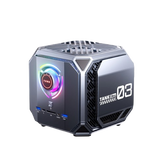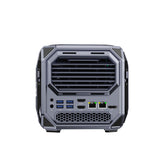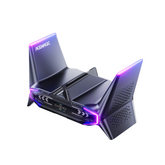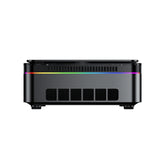Why You Need a Proper Cooling System to Game?

The Forgotten Spine of Gaming Performance
Gamers may often think of gaming PCs as featuring top-of-the-range graphics cards, powerful CPUs, or super-fast SSDs. And even though these hardware components are vital to smooth gameplay, there is one very overlooked parameter that quietly determines whether your system will perform well or lag behind when the times get difficult—the cooling system.
Games today push your hardware to its limits. Whether you're exploring open worlds in Cyberpunk 2077, combatting in competitive multiplayer worlds, or streaming your game live, your CPU and GPU are working in overdrive—and generating a lot of heat, to boot. Without cooling, that heat builds up quickly, causing performance loss, system instability, and even hardware damage.
In this article, we’ll explore why a reliable and effective cooling system is no longer optional but essential for any serious gamer. From performance consistency to protecting your investment, cooling plays a key role in unlocking your PC's full potential.
1. Why Gaming Generates So Much Heat
Gaming is one of the most demanding things you can do to a computer. In contrast to web surfing or document editing, which stress your GPU and CPU to perform at close to their maximum capacity—typically for a long time—gaming places them under significant use. This heavy load causes the hardware elements to consume more power and, as a result, produce more heat.
Install premium graphics cards like the NVIDIA RTX 4090 or premium CPUs like the Intel i9-12900H: when subjected to a heavy gaming load, these processors are not too shy about hitting temperatures of 80°C or more. And that is not a number—when a component hits some thermal thresholds, it can start thermal throttling, where it will intentionally throttle itself to avoid overheating. That means lost frame rates, stuttering response times, and a generally worse experience.
And it's not limited to high-end systems. Mid-range systems can also end up overheating if their cooling mechanisms can't keep up. Poor case ventilation, dusting, and thermal paste all may contribute to hot spots inside your PC that affect performance.
2. The Effects of Deteriorating Cooling
a. Thermal Throttling Slows You Down
When your CPU or GPU overheats, it automatically cuts back on its clock speed to prevent damage. This is thermal throttling. This protective mechanism prevents your hardware from getting damaged but comes with a cost: severe performance loss.
You may see unstable frame rates, spikes of lag, or even a total breakdown in image quality. Such issues are particularly noticeable in competitive games where every frame counts. Really, without sufficient cooling, you're not getting the performance you paid for.
b. System Instability and Crashes
Excessive heat doesn't just reduce performance—it can destabilize your system entirely. Overheating may cause crashes, reboots, or dreaded blue screens. For gamers, this is more than an inconvenience—it could mean losing progress in a match or damaging your hardware over time.
c. Long-Term Hardware Damage
Heat is one of the primary causes of component degradation. Prolonged exposure to high temperatures accelerates wear and tear on primary components like capacitors, silicon chips, and solder joints. This can lead to damage or failure in a permanent capacity, reducing the life of your system.
3. How Cooling Enhances Gaming Performance
Cooling isn't just about preventing problems—it actually enhances your performance. Here's how:
-
Consistent clock rates: At a constant temperature, CPUs and GPUs can maintain their highest boost frequencies for longer durations, leading to more immediate responsiveness and increased frame rates.
-
Better multitasking: Streamers, recorders, and multi-application users will enjoy a cool computer that can handle multiple requests at the same time.
-
Space for overclocking: If you want to suck out additional power from your hardware, then overclocking is the answer. But only if your cooling setup is capable of handling the higher heat.
In essence, better cooling equals faster, stable, and more resilient gameplay.
4. Air Cooling vs. Liquid Cooling: Which One Is Right for You?
The liquid cooling vs air cooling debate is at the heart of selecting the optimal thermal solution for your gaming machine. Both methods have something to offer based on your performance objectives, price, and system architecture.

a. Air Cooling
Air cooling is the most widely used and affordable solution. It leverages heatsinks and fans for heat transfer from components and radiation through airflow. Big heat sinks and dual/triple fan stacks on high-end air coolers can handle most gaming loads.
Advantages:
-
Affordable
-
Simple to install
-
Low maintenance and trustworthy
Disadvantages:
-
Large and heavy in size
-
Noisy when maximally loaded
-
Lower headroom for extreme overclocking
b. Liquid Cooling
Liquid cooling uses a pump to force coolant through a CPU or GPU block, warming it to a radiator cooled by fans. Available in AIO (All-in-One) or custom loop configurations, liquid cooling offers improved performance and appearance.
Strengths:
-
Enhanced thermal efficiency, especially at load
-
Noisy system reduction
-
Thinner designs with RGB support
Weaknesses:
-
Higher cost
-
Difficulty in installation
-
Potential maintenance (especially custom loops)
When deciding between liquid cooling and air cooling, consider your system's heat needs, noise acceptance, and free space. Gamers who value the best performance, silent operation, or aesthetics may find liquid cooling worth it—even in high-TDP builds.
5. Cooling Extends the Life of Your Hardware
Heat kills slowly. The longer your parts are kept hot, the quicker their materials degrade. Sooner or later, this results in slower performance, crashes, or total failure.
A proper cooling system alleviates thermal stress, preserving your hardware for years to come. For gamers investing in high-end GPUs and CPUs, this protection is crucial. It's not just about today's performance—it's about defending your entire system for tomorrow.
6. Bonus Benefits: Silence and Style
a. Quieter Gameplay
High-performance cooling doesn’t have to mean loud fans. Premium air coolers and modern AIO systems are designed to run efficiently and quietly. Whether you’re gaming at night or live-streaming to an audience, lower noise means fewer distractions.
b. Aesthetic Upgrades
Most modern cooling solutions are engineered with aesthetics. RGB-lit fans, water blocks designed to order, and tubing are just a few examples. A good cooling system will alter the look of your build as well. Gamers who care about appearance are likely to view cooling as both an aesthetic and performance enhancement.
By comprehending the significance of cooling, gamers can make better choices in their PC builds, prevent infuriating performance problems, and guarantee that all dollars invested in robust hardware reap its full return. Regardless of whether you're using air or liquid cooling, the message is certain: don't sell short the power of staying cool under fire.








Leave a comment
Please note, comments need to be approved before they are published.